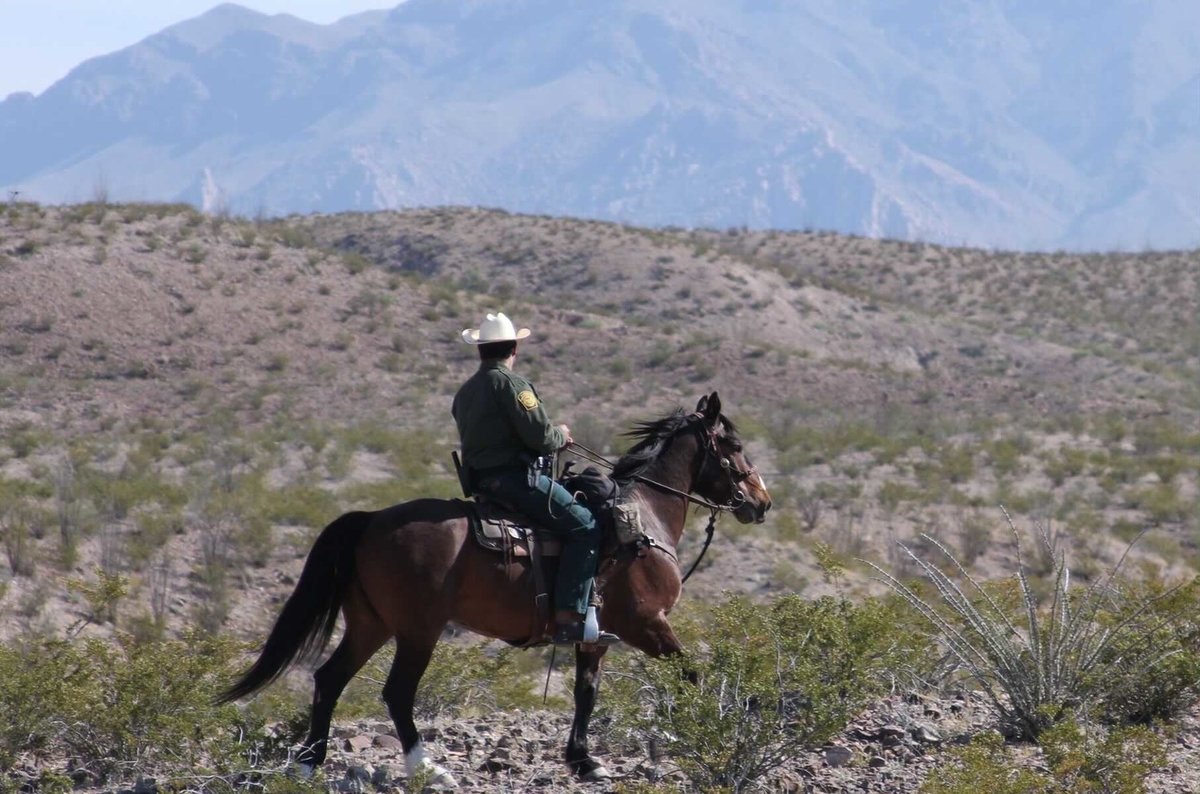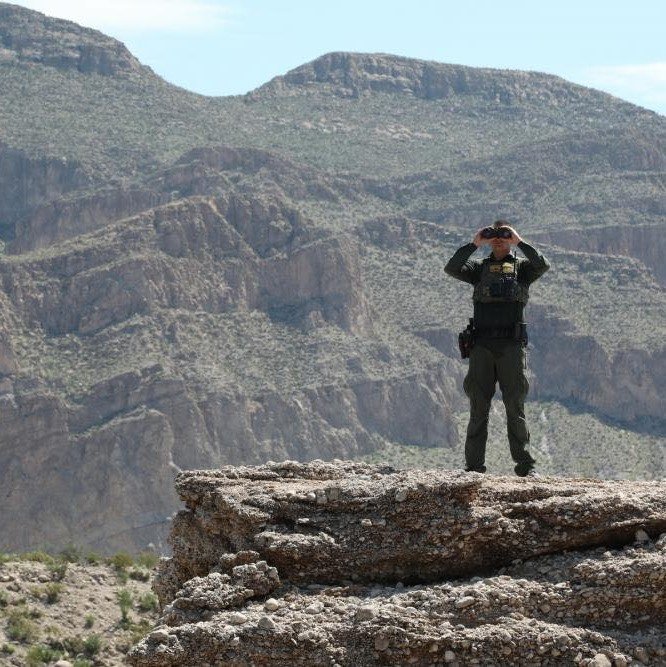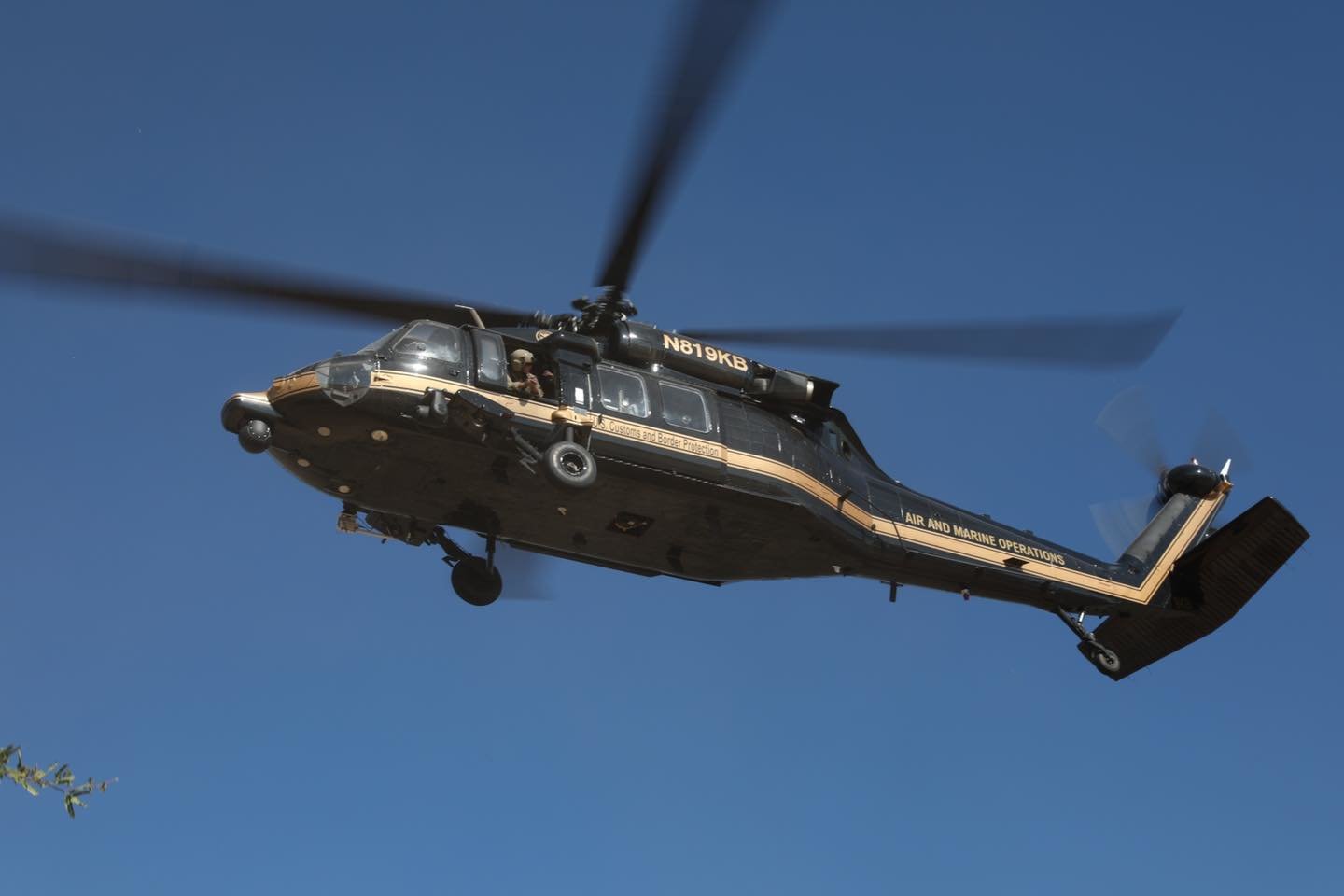‘Faint Screaming’ and Agents on Horseback: Inside the Border Patrol Rescue of a Lost Hiker

A Horse Patrol Unit rides across Big Bend National Park on Monday, Sept. 27, 2021. Photo courtesy of US Border Patrol.
Sixteen hours into a search inside Big Bend National Park’s remote backcountry, US Border Patrol agents on horseback heard what they called “faint screaming.”
About 20 miles north of the Rio Grande River on Tuesday afternoon, Sept. 28, the Horse Patrol Unit was following a series of footprints deep into the West Texas park’s Juniper Canyon. The calls brought them to a lost hiker described by Customs and Border Protection officials as “a woman in her 20s” who “was responsive.”
The Horse Patrol radioed for help and Border Patrol Search, Trauma, and Rescue paramedics arrived by helicopter to immediately begin treating her for what they described as “minor injuries.”
A Customs and Border Protection Air and Marine Operations UH-60 Black Hawk helicopter then rushed her to Big Bend Regional Medical Center in Alpine.

“The coordinated actions of all agencies involved led to the successful rescue of a lost hiker,” said Border Patrol’s Big Bend Sector Chief Sean L. McGoffin in a written statement emailed to Coffee or Die Magazine. “This is a great example where multiple local agencies pooled their resources to work together to save a life. We appreciate the close working partnerships in the Big Bend region.”
Hospital officials did not return messages from Coffee or Die seeking comment, but Border Patrol indicated she was released Tuesday evening.
Big Bend National Park spokesman Thomas D. VandenBerg told Coffee or Die that his agency had overall command of the search and logistical support, with six park personnel joining the hunt.
“We are all glad that the hiker was successfully located, and without significant injury,” he said.
National Park Service officials learned late Monday afternoon that the woman — described as an experienced hiker —was overdue from her visit in Big Bend National Park.
Because of its complex topography, lack of watering holes, dangerous wildlife, weather extremes, and primitive camping options, park rangers require backcountry hiking permits and won’t approve them if visitors fail to submit a detailed itinerary.
But Big Bend’s VandenBerg said the woman was a day hiker and wasn’t required to obtain a permit.
Although they immediately began what Customs and Border Protection officials described as a “hasty search,” rescuers on Monday turned up no clues pinpointing her location. Fearing that operations in the dark would put rescuers at risk, the National Park Service suspended the hunt until morning.
That gave time for the National Park Service, Customs and Border Protection’s Air and Marine Operations, and the Texas state Department of Public Safety to mobilize alongside Border Patrol to scout for the missing hiker at dawn.

Big Bend National Park sprawls across 1,252 square miles, a vast expanse of the Chihuahuan Desert that includes deep limestone canyons, sky island mountains, and the Rio Grande River, which serves as the international border with Mexico.
A dragnet across an expanse as large as Rhode Island could take days, maybe even weeks, so the search parties set off from her last known location, the Chisos Basin.
Once Border Patrol agents found her footprints, officials said they “leapfrogged” the Horse Patrol Unit by truck to a stretch of the trail where they thought they’d likely find her, and they guessed right.
VandenBerg said his rangers and Border Patrol team up to aid “dozens of hikers every year” along the park’s 200 miles of trails, with everything from tourists’ medical emergencies to rescue missions for undocumented migrants lost in the brush without water.
Border Patrol reported that agents have rescued 745 undocumented migrants in and near the park since the federal fiscal year began on Oct. 1. They also found 39 dead bodies.
Over the past decade, those incidents have included:
- A Nov. 23, 2012, attack by a mountain lion on hiker Andrea Pinero Cebrian in the remote Mesa de Anguila near Lajitas. Terlingua medics treated her for what park officials described as minor injuries.
- The Nov. 7, 2016, rescue of overdue hiker Calvin Parker of New Orleans near the Mesa de Anguila. After he was treated for dehydration, rescuers flew him to Lajitas International Airport so park rangers could shuttle him to his vehicle.
- The Sept. 3, 2018, rescue of Edilberto “Beto” Lopez of Katy, Texas. National Park Service and Border Patrol personnel found him alive along the upper Pinnacles Trail after a two-day search. He’d run out of water in the open desert before tracking back toward the mountains.
- The Oct. 5, 2019, death of an unidentified 73-year-old man from Austin, Texas. He collapsed along the Emory Peak Trail in the Chisos Mountains. Bystanders performed CPR on the experienced hiker for several hours before a team of park rangers and Border Patrol agents arrived to assist, but their efforts were unsuccessful.
- On April 6 of this year, an unnamed 51-year-old woman visiting Big Bend with her husband collapsed along the rocky Upper Burro Mesa Pouroff Trail. Rangers and other hikers performed CPR on her for more than an hour but she could not be resuscitated.
This story was updated at 5:38 p.m. on Sept. 29, 2021 to include the number of undocumented migrants rescued by US Border Patrol this fiscal year.
Read Next:

Carl Prine is a former senior editor at Coffee or Die Magazine. He has worked at Navy Times, The San Diego Union-Tribune, and Pittsburgh Tribune-Review. He served in the Marine Corps and the Pennsylvania Army National Guard. His awards include the Joseph Galloway Award for Distinguished Reporting on the military, a first prize from Investigative Reporters & Editors, and the Combat Infantryman Badge.
BRCC and Bad Moon Print Press team up for an exclusive, limited-edition T-shirt design!
BRCC partners with Team Room Design for an exclusive T-shirt release!
Thirty Seconds Out has partnered with BRCC for an exclusive shirt design invoking the God of Winter.
Lucas O'Hara of Grizzly Forge has teamed up with BRCC for a badass, exclusive Shirt Club T-shirt design featuring his most popular knife and tiomahawk.
Coffee or Die sits down with one of the graphic designers behind Black Rifle Coffee's signature look and vibe.
Biden will award the Medal of Honor to a Vietnam War Army helicopter pilot who risked his life to save a reconnaissance team from almost certain death.
Ever wonder how much Jack Mandaville would f*ck sh*t up if he went back in time? The American Revolution didn't even see him coming.
A nearly 200-year-old West Point time capsule that at first appeared to yield little more than dust contains hidden treasure, the US Military Academy said.












